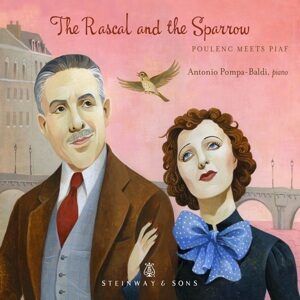There are some brilliantly original keyboard recitals coming from independent labels these days, and this is certainly one of them. Antonio Pompa-Baldi is best known for his excellent ongoing complete Grieg piano music cycle on Centaur. For this, his first recital on Steinway’s own label, he offers an unusual, intelligent, and very satisfying disc of transcriptions of songs composed by Poulenc (the “rascal” of the album title), and a solo-keyboard selection of popular favorites sung by Edith Piaf (the “sparrow”), including iconic numbers such as “La vie en rose” and “Non, je ne regrette rien”. The Piaf transcriptions are by Roberto Piana, while Pompa-Baldi himself arranged the Poulenc songs (except of course for the Improvisation No. 15, Poulenc’s “Hommage à Edith Piaf”, which is a piano solo originally).
The art of transcribing songs for the piano goes back at least to Liszt and his first Schubert song transcriptions of the 1830s. Piana calls his Piaf arrangements “elaborations”, for that really is what they are—the song used as the basis for a self-contained keyboard miniature. Pompa-Baldi follows the same general pattern. For example, Poulenc’s song “Je n’ai envie que de t’aimer” from the cycle Tel jour, telle nuit lasts scarcely 30 seconds in Poulenc’s own performance with baritone Pierre Bernac. Here the piece is taken slower, and extended for a full minute and a half. In this arrangement it sounds “torchier”, more like a Piaf song, but also more satisfyingly complete. Not that there is any stylistic incompatibility between Poulenc and the cabaret song-writers of his day—far from it. Poulenc’s idiom is saturated with the sounds of the Parisian cabarets of the 1920s and ’30s, and beyond that, a great song is a great song, period. In this genre, terms such as “classical” and “popular” for the most part are meaningless labels.
Some of the better known Poulenc songs that Pompa-Baldi includes are “C”, “Les chemins de l’amour” (which even listeners who know nothing of Poulenc’s songs will recognize), “Montparnasse”, “Hyde Park”, and “Vous n’écrivez plus?”. There are 27 numbers in all, each wonderfully played, with a pathos that never turns pathetic in the more languishing pieces, and a zesty swagger where the music asks for it. Both Poulenc and Piaf died 50 years ago, in 1963, making this disc a splendid tribute to two major contemporaneous figures in French music who, to the best of our knowledge, never actually met. How satisfying it also is that Steinway is not in any hurry to record yet another Beethoven sonata cycle, but is willing to let talented yet lesser-known artists record truly interesting, distinctive programs. This one’s certainly a winner from start to finish.
































